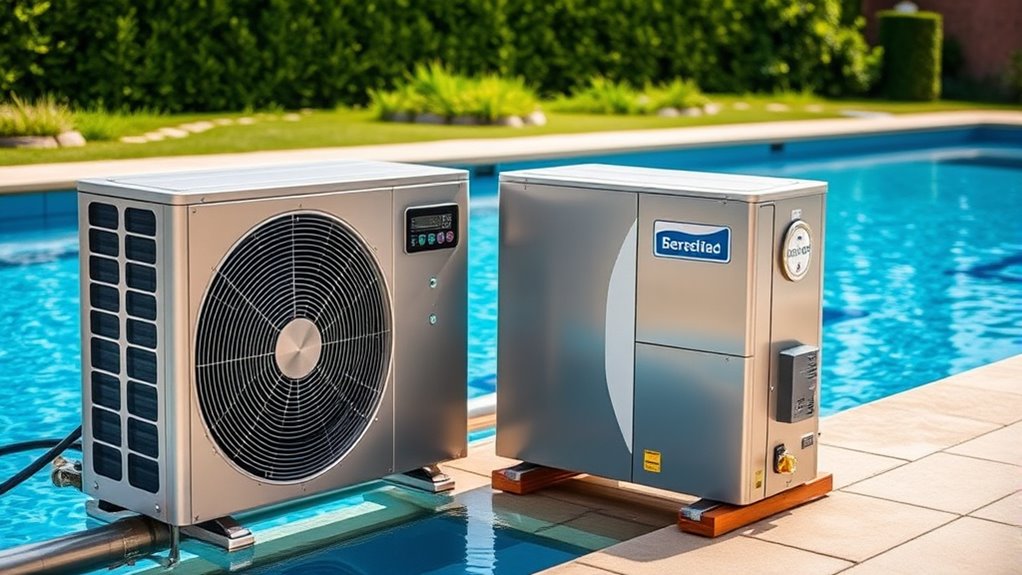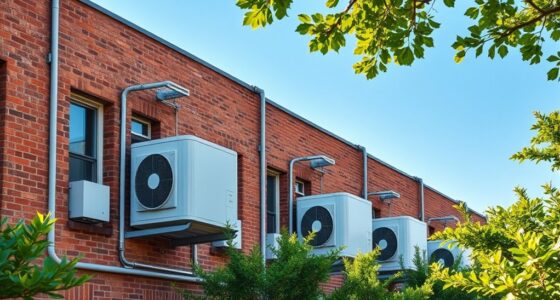Heat pumps are an efficient way for you to heat and cool your swimming pool year-round. They transfer heat from the air to warm your water or remove it to cool your pool, using less energy than traditional systems. They’re eco-friendly, quiet, and require minimal maintenance. Choosing the right model and keeping it well-maintained can help you save money and stay comfortable. To learn more about how to maximize their benefits, continue exploring the options available.
Key Takeaways
- Heat pumps transfer heat from the air to warm or cool pool water efficiently year-round.
- They consume less electricity and produce fewer emissions than traditional gas or electric heaters.
- Proper sizing and installation are crucial for optimal performance and energy savings.
- Regular maintenance ensures durability, efficient operation, and extended system lifespan.
- Compared to traditional systems, heat pumps offer a cost-effective, eco-friendly solution for pool climate control.
How Heat Pumps Work for Pool Climate Control

Heat pumps work by transferring heat from the surrounding air to your pool water, even in cooler temperatures. Their solar efficiency depends on capturing as much heat from the air as possible, making them energy-efficient options. Modern compressor technology plays a key role in this process, compressing refrigerant to increase temperature before releasing it into your pool. The compressor’s performance directly impacts how well the heat pump can operate in varying weather conditions. As the refrigerant cycles through the system, it absorbs heat from the air and transfers it to your pool water, effectively maintaining a comfortable temperature. Attention to detail in system design and operation further enhances efficiency and reliability. This combination of advanced compressor technology and optimized solar efficiency allows heat pumps to deliver reliable, eco-friendly climate control for your pool year-round.
Benefits of Using Heat Pumps for Your Pool

Using a heat pump for your pool offers numerous advantages, starting with energy efficiency. Heat pumps consume less electricity than traditional heating methods, helping you save on energy bills. This efficiency not only benefits your wallet but also reduces the environmental impact of heating your pool. By using ambient air to generate heat, heat pumps produce fewer greenhouse gases than gas or electric resistance heaters. Additionally, they operate quietly and require less maintenance, making them a convenient choice. The consistent, cost-effective heating ensures your pool stays comfortable year-round without excessive energy consumption. Moreover, understanding affiliate marketing disclosures can help you make informed decisions when purchasing pool equipment online. Overall, choosing a heat pump allows you to enjoy your pool more often while being more eco-friendly and mindful of your budget.
Factors to Consider When Choosing a Pool Heat Pump

When choosing a pool heat pump, it’s vital to take into account factors that will guarantee maximum performance and energy efficiency. First, assess the unit’s energy efficiency ratings, such as COP (Coefficient of Performance), to ensure it consumes less power while providing effective heating or cooling. A higher COP means better efficiency and lower operating costs. Next, conduct a thorough cost analysis, considering the upfront purchase price, installation expenses, and long-term energy savings. Size the heat pump appropriately to match your pool’s size and heating needs; an undersized unit will struggle, while an oversized one wastes energy. Also, look for models with good durability and reliable customer support. Carefully evaluating these factors helps you select a pool heat pump that balances performance, efficiency, and cost. Additionally, considering Honda Tuning options for related vehicle upgrades can provide insight into optimizing your overall energy and performance systems.
Installation and Maintenance Tips for Longevity

Proper installation and regular maintenance are key to guaranteeing your pool heat pump operates efficiently and lasts for years. Choose a location with good airflow, away from noise-sensitive areas, to promote noise reduction and energy efficiency. Make sure the unit is level and securely mounted, and follow the manufacturer’s guidelines during setup. Regularly clean or replace filters, check for debris around the unit, and inspect refrigerant levels to keep the system running smoothly. Schedule annual professional checkups to catch potential issues early. Keep the area clear of obstructions to maintain ideal airflow. Proper maintenance not only extends the lifespan of your heat pump but also ensures it runs quietly and efficiently, saving you money on energy costs while providing consistent comfort.
Comparing Heat Pumps to Traditional Pool Heating Systems

Heat pumps offer a modern, energy-efficient alternative to traditional pool heating systems such as gas or electric heaters. When comparing costs, heat pumps typically have a higher upfront price but markedly lower operating expenses due to their efficiency. Over time, you’ll save money on energy bills, making them more economical in the long run. From an environmental perspective, heat pumps have a smaller carbon footprint because they use electricity and transfer heat rather than burning fossil fuels. Traditional gas or electric heaters emit more greenhouse gases and consume more energy. If you’re aiming to reduce your environmental impact while managing costs, heat pumps are a smart choice. They provide sustainable, cost-effective heating options that align with eco-friendly priorities. Additionally, advancements in AI security are helping improve the safety and reliability of these systems.
Frequently Asked Questions
How Energy-Efficient Are Heat Pumps Compared to Solar Pool Heaters?
When comparing energy efficiency, heat pumps typically offer greater energy savings than solar pool heaters. They extract heat from the air, working efficiently even in cooler weather, which reduces your energy consumption. This also means a lower environmental impact since they use less electricity and produce fewer emissions. Overall, heat pumps provide a reliable, eco-friendly way to heat your pool while saving you money on energy costs.
Can Heat Pumps Effectively Cool My Pool During Hot Summer Days?
Perfectly poised for pool temperature regulation, heat pumps do more than just heat—they can cool your outdoor or indoor pool effectively during summer’s sweltering days. You’ll find their cooling capacity fantastic for maintaining comfort, especially in outdoor pools exposed to direct sun. While they excel at heating, their ability to cool is equally impressive, making them a versatile solution for cooling your pool and keeping it comfortably invigorating all season long.
What Is the Typical Lifespan of a Pool Heat Pump?
The typical lifespan of a pool heat pump is around 10 to 15 years, depending on heat pump durability and maintenance requirements. Regular inspections and proper care can extend its life, ensuring it operates efficiently. Keep your system clean, check for refrigerant leaks, and schedule professional servicing annually. By maintaining your heat pump well, you’ll maximize its longevity and get the most value from your investment.
Are Heat Pumps Suitable for All Pool Sizes and Types?
Like a tailor fitting a suit, choosing the right system depends on your pool size and material. Heat pumps work well for most pools, but larger or uniquely shaped pools may need more powerful units. Consider pool size considerations and pool material compatibility to guarantee efficiency. While they’re suitable for many, always check if your pool’s specifics match the heat pump’s capabilities for ideal performance and longevity.
How Do Climate Conditions Affect Heat Pump Performance?
Climate conditions substantially impact heat pump performance. In areas with climate variability, you’ll notice fluctuating efficiency levels. Cold temperatures can reduce a heat pump’s ability to transfer heat, requiring seasonal adjustments like auxiliary heating. Conversely, warmer climates boost performance and save energy. Understanding your local climate helps you optimize your system, ensuring consistent heating and cooling while minimizing energy costs throughout the year.
Conclusion
Choosing a heat pump means you’ll enjoy a comfortable pool year-round without the fuss of old-fashioned methods. It’s like having a trusty steed instead of a clunky bicycle—more reliable and efficient. With proper installation and maintenance, your heat pump will serve you well, turning your pool into a timeless oasis. Embrace this modern marvel and make every swim a delightful experience, because in the end, comfort and savings are worth their weight in gold.









